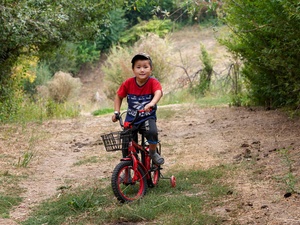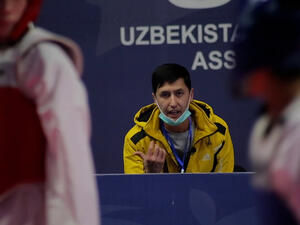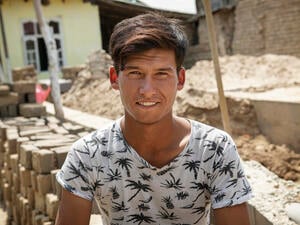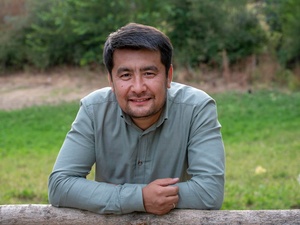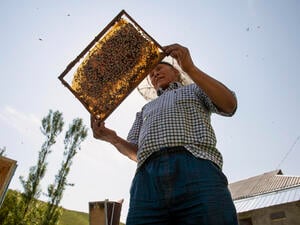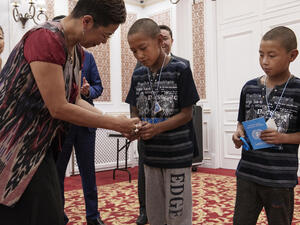UNHCR Kyrgyzstan uses all tools to secure a future for refugees
UNHCR Kyrgyzstan uses all tools to secure a future for refugees

Odina Akhunbaev (foreground), a refugee from Tajikistan who has received citizenship in Kyrgyzstan, works now at a hospital in Ivanovka after training in a UNHCR-supported integration programme.
BISHKEK, Kyrgyzstan, June 7 (UNHCR) - As Kyrgyzstan struggled to emerge from the wreckage of the Soviet Union, it had to cope also with refugees from two wars that ravaged other countries in the region. Now, thanks to flexibility from the governments of both Kyrgyzstan and Canada, there is a good chance that the refugee problems that still beset their neighbours will be largely solved by the end of this year.
Most of the remaining 650 Afghans who found refuge in Kyrgyzstan from the decades of war in their homeland - and were unlikely to ever find it safe to return, often because of past associations with the Soviet-backed government there - have been accepted by Canada for resettlement and will be leaving to start new lives there in the next few months.
"We think at the end of the year we will have 150 Afghans left here," said James Lynch, head of the UN refugee agency office in Kyrgyzstan, who had brought the situation to the attention of Canadian immigration officials based in Moscow. "Then the Kyrgyz government will re-examine those cases. Some refugees might opt for voluntary repatriation and after that the residual caseload can apply for Kyrgyz citizenship."
At the same time, most of the remaining 5,000 refugees from the civil war that convulsed neighbouring Tajikistan after the disintegration of the Soviet Union - largely ethnic Kyrgyz who do not want to return to the country where their ancestors moved decades ago - are expected to be granted full local citizenship later this year.
Kyrgyz Prime Minister Nikolay Tanayev signed instructions late last month to implement simplified naturalisation procedures agreed under the Bilateral Agreement between Kyrgyzstan and neighbouring Tajikistan that was accepted 18 months ago.
Now that the agreement's implementation has been clarified, the UN refugee agency expects that most of the remaining ethnic Kyrgyz will be joining more than 4,000 refugees from Tajikistan who have already received citizenship under earlier government decisions, often at formal ceremonies with senior state leaders.
"It should now move at a rapid rate," Lynch said at the UNHCR office in the capital Bishkek, pleased at one of the rare cases of local integration in a world where host governments normally rule out the granting of citizenship. "We already have developed a network of legal and refugee NGOs to help each family with its citizenship application. We expect only a small residual population in 2005."
The release of the recently signed instructions is expected over the coming months to considerably relieve the bureaucratic bottlenecks that have sometimes slowed the citizenship application process. UNHCR recently printed and distributed more than 2,000 citizenship applications to offices that might be approached by refugees seeking citizenship information under the government's newly expedited guidelines.
Last Friday, 35 Tajik ethnic Kyrgyz refugees received Kyrgyz citizenship and passports in a ceremony held in Dom Kultury in the country's Tokmok region. The ceremony was led by the region's deputy government and other senior national and regional officials, as well as UNHCR staff.
Meanwhile, use of the local integration option and resettlement to Canada following the repatriation of more than 7,000 other refugees back to Tajikistan and a few Afghans to their homeland, has meant that UNHCR's team in Kyrgyzstan has made full use of all three of the "durable solutions" the UN refugee agency advocates.
The largest task for UNHCR has been helping the refugees from Tajikistan's 1992-97 civil war, with the repatriation leaving mainly ethnic Kyrgyz who said they do not want to return and would like to become citizens of Kyrgyzstan.
"We came to Kyrgyzstan and don't want to return," said Razyk Maksudov, the 69-year-old patriarch of an extended family living in a small house in Ivanovka, a town east of the capital where many of the refugees are living. "We lost our son in the war there and don't want to go back."
His family is among those awaiting the government go-ahead to receive citizenship. Others in the town have already acquired their new nationality under previous laws that granted citizenship to various categories of refugees who arrived early in the Tajikistan civil war.
The Kyrgyz non-governmental organisation Sairon, which had been supported by UNHCR since its foundation in 1999, has been helping the refugees - both those already given citizenship and those awaiting the step - to integrate into the local communities.
"When the refugees first arrived there was a perception 'they would eat our bread and live on our land'," said Vakhobjon Rasulov, the 37-year-old head of Sairon and himself a former refugee from Tajikistan. Those initial fears were overcome, he said, largely through UNHCR making clear to the community that it was there to help and the burden of receiving the refugees would not fall on the local population.
"It's now been over 10 years since the first refugees arrived and they have proved to be hard workers," Rasulov said at their headquarters in Ivanovka. "They have provided their contribution to the economy."
Such a solution was never likely for the Afghans. None has been locally integrated so far and few have returned. Some were students in Kyrgyzstan when war raged against Soviet forces in Afghanistan in the 1980s, others were associated with the leftist Najibullah government that was overthrown in 1992 and a final wave fled when the Taliban seized Kabul in 1996.
A solution to their predicament seemed elusive until the breakthrough this year. But, in what has become a group resettlement process, the Canadian embassy in Moscow sent in a team that poured over all 650 cases registered with UNHCR, accepting more than 80 percent of the population.
The process has raised hopes now of a similar solution elsewhere in the Central Asia region, where there are also refugee populations - often well educated - who are unlikely to repatriate. Canadian diplomats are expected to arrive in Tajikistan soon to see if the Afghan refugees there might also soon be on their way to new lives.




